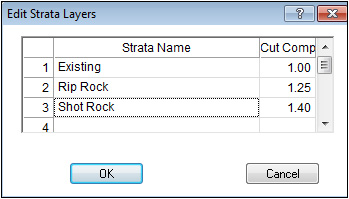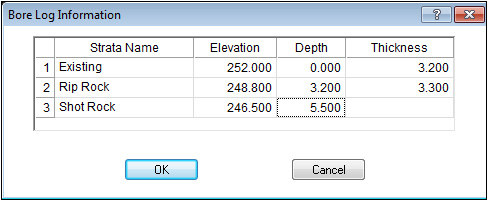![]()
Strata Bore Holes
Strata Bore Holes are entered in the Strata Bore Holes layer in the Existing surface. When entering strata bore holes for the first time on a job, the Edit Strata Layers window displays.

The Existing layer on line one is the original ground. Type in the name and cut compaction value for each strata layer and press the Ok button. The Bore Log Information window now displays.

|
|
|
|
STRATA NAME |
The name of the strata layer |
|
|
|
|
ELEVATION |
The survey elevation of the top of the strata layer |
|
|
|
|
DEPTH |
The depth from the surface of the existing ground to the top of the strata layer |
|
|
|
|
THICKNESS |
The thickness of the strata layer between the other layers |
The information that displays in this window is specific to the current boring. The elevation of the existing ground is displayed in the Existing layer elevation text box with a depth of 0. The Existing layer always has a depth of 0 because it is at the surface. Change the depths of the strata layers as needed and press the OK button.
For each additional boring, simply press the Enter button over the location on the grading plan sheet and edit the information that displays when the Bore Log Information window displays for each bore hole.
![]()
Strata Break Lines
The Strata Bore Holes are connected to each other by Strata Break Lines. These lines are automatically generated after the strata is entered and placed in the Strata Break Lines layer. The Data Lines layer in each strata surface also contains lines which help to form the 3D surface model. The Data Lines in each strata layer can either follow the existing ground slopes or slope straight from bore to bore. This is determined by using the Strata Tracks OG option under the Options Menu in Edit Mode. When this option is checked, it allows the strata to slope from one bore hole to the next following the terrain of the existing ground. When this option is unchecked, the strata slopes straight from one boring to the next. Generally, having the strata track the existing ground can create a more realistic strata layer design.